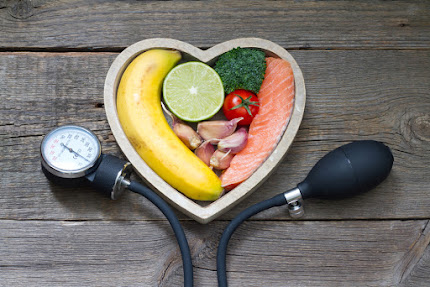7 Ways To Lower Blood Pressure Without Medication
Here are
7 natural remedies for high blood pressure.
1. Walk and
exercise on a regular basis.
Exercise is one
of the most effective ways to reduce high blood pressure. Regular exercise
strengthens your heart and makes it more efficient at pumping blood, and lowering
artery pressure.
Indeed, 150
minutes of moderate exercise per week, such as walking, or 75 minutes of
vigorous exercise, such as running, can help lower blood pressure and improve
heart health.
2. Limit your
sodium intake.
Globally, people
consume a lot of salt. This is mainly due to processed and prepared foods.
As a result,
many public health initiatives are aimed at reducing salt in the food industry.
Many studies
have linked excessive salt consumption to high blood pressure and
cardiovascular events, including stroke.
Recent research,
however, suggests that the link between sodium and high blood pressure is less
clear.
One reason for
this could be genetic differences in sodium metabolism. A quarter of people
with normal blood pressure and half of those with high blood pressure appear to
be salt sensitive. If you already have high blood pressure, reducing your
sodium intake may help.
3. Drink less
alcohol
Alcohol
consumption can cause an increase in blood pressure. In fact, alcohol is linked
to 16% of high blood pressure cases worldwide. While some research suggests
that moderate amounts of alcohol may protect the heart, those benefits may be
outweighed by negative consequences.
4. Consume more
potassium-rich foods.
Potassium is an
essential mineral. It aids in sodium elimination and reduces blood vessel
pressure. Most people's sodium intake has increased while their potassium
intake has decreased as a result of modern diets. Focus on eating fewer
processed foods and more fresh, whole foods to achieve a better
potassium-to-sodium ratio in your diet.
The following
foods are particularly high in potassium:
Fruit,
particularly melons, bananas, avocados, oranges, and apricots, vegetables,
particularly leafy greens, tomatoes, potatoes, and sweet potatoes, dairy
products such as milk and yogurt, nuts and seeds tuna and salmon beans.
5. Give up
smoking
One of the many
reasons to stop smoking is that it is a major risk factor for heart disease.
Every cigarette puff causes a slight, temporary increase in blood pressure.
Tobacco chemicals have also been linked to blood vessel damage.
Surprisingly,
studies have failed to establish a definitive link between smoking and high
blood pressure. Perhaps this is due to the fact that smokers develop a
tolerance over time.
6. Consume
berries
Berries contain
more than just juicy flavor. They're also high in polyphenols, which are
natural plant compounds that are beneficial to your heart. Polyphenols have
been shown to lower the risk of stroke, heart disease, and diabetes while also
improving blood pressure, insulin resistance, and systemic inflammation.
In one study,
people with high blood pressure were randomly assigned to either a
low-polyphenol diet or a high-polyphenol diet that included berries, chocolate,
fruits, and vegetables. Those who consumed berries and polyphenol-rich foods
had lower levels of heart disease risk markers.
7. Try
meditation or deep breathing
While both behaviors could be classified as "stress reduction techniques,"
meditation and deep breathing deserve special attention. Meditation and deep
breathing both have the potential to activate the parasympathetic nervous
system. When the body relaxes, this system kicks in, slowing the heart rate and
lowering blood pressure.
There has been a
significant amount of research in this area, with studies indicating that
various styles of meditation appear to have benefits for lowering blood
pressure. Deep breathing techniques can also be very beneficial.
for info ANP Pharma




Comments
Post a Comment